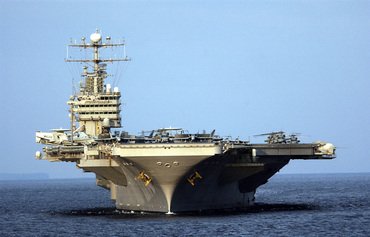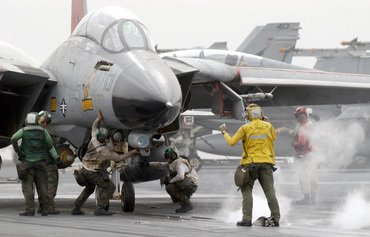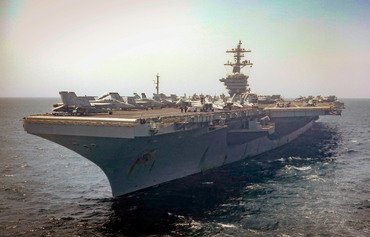The arrival of the USS Abraham Lincoln aircraft carrier at Khalifa Bin Salman Port in Bahrain represents the continuing resolve of the US and its Gulf partners to combat terrorism in the region as well as threats from Iran, analysts say.
The Abraham Lincoln Carrier Strike Group transited through the Strait of Hormuz and into the Arabian Gulf on November 19th. Three days later, it began air operations in support of Operation Inherent Resolve, the US Naval Forces Central Command reported.
It was deployed to the region in May in response to what then-US National Security Adviser John Bolton referred to as "troubling and escalatory indications and warnings" from Iran.
On November 20th, the USS Abraham Lincoln arrived at port in Bahrain after spending more than six months in the Arabian Sea and the Gulf of Oman.
"As we navigate throughout the theatre, we will exercise our vast capabilities and interoperability with international partners, as a mobile and lethal force," said Capt. Walt Slaughter, commanding officer of USS Abraham Lincoln.
"We are the tip of the spear, and we will continue to work with our coalition allies to ensure regional security," he said.
'Exerting pressure on Iran'
The presence of the USS Abraham Lincoln in the Gulf is an important step towards enhancing security and stability in the region in light of Iran's repeated attacks on vital Gulf oil facilities, Bahraini political analysts told Al-Mashareq.
The presence of the strike group in Bahrain has a security and economic dimension -- namely protecting the security of maritime navigation and commercial ships traversing through the region, such as oil tankers, said Bahraini journalist Tamam Abu Safi.
It also "falls within the policy of exerting pressure on Iran", she said.
"The arrival of the aircraft carrier in the Gulf region was not an isolated military move but rather as part of a campaign by the US to exert maximum pressure on the Iranian regime that includes economic, political and military steps," she told Al-Mashareq.
"The mission of a carrier such as this... usually centres on providing logistical support to small and medium naval patrols operating under its command, as well as the conduct of reconnaissance flights by its F-15 and F-18 jets and naval helicopters," Abu Safi said.
"The carrier operates under the direct command of the 5th Fleet central command based in Bahrain and is leading the coalition to protect navigation in the region," she said.
Its tasks encompass an area extending from northern Kuwait to the Arabian Sea.
There is a real need for protecting the region's waterways, particularly the Strait of Hormuz in the Gulf, and enhancing confidence in the region's maritime security, Abu Safi said.
Protecting the Strait of Hormuz
The deployment of the USS Abraham Lincoln "is part of the US government's plan to strengthen its military's presence in the waters of the Arabian Gulf to safeguard the safety of navigation, especially in view of... the Iranian threats to vital facilities and installations", said Bahraini political analyst Saad Rashid.
"The US found itself committed to the important [task] of protecting territorial waters, in particular protecting the interests of its allies and its own interests in the region," he told Al-Mashareq.
This is especially important since Gulf waters -- specifically the Strait of Hormuz -- are a vital corridor for energy sources and other free trade commodities, he said.
The USS Abraham Lincoln "is one of the US's main aircraft carriers and is equipped with advanced technology, particularly in the areas of target monitoring and rapid response to any security or military threat", he said.
"Gulf Co-operation Council (GCC) countries recognise the importance of international partnerships, with the US in particular, in protecting waterways," Rashid said.
"The US is making concerted efforts to ensure the protection of regional waterways and to respond to repeated Iranian threats," he added.
The strategic and security relations that tie Bahrain and the US are long-standing and deep-rooted, political analyst Ibrahim al-Naham told Al-Mashareq.
The arrival of USS Abraham Lincoln at Bahraini ports "comes in the context of enhancing navigational and maritime security in the Arabian Gulf, and preventing any new attempts by Iran or militias affiliated with it in the region to undermine the security of the Gulf, and Bahrain's security specifically," he said.
Gulf citizens believe US forces "have a real role to play in reigning in Iranian terrorism and that of terror groups affiliated with it", he said, including militias in Iraq, the Houthis (Ansarallah) in Yemen and Hizbullah in Lebanon.

![An F/A-18F Super Hornet attached to the 'Jolly Rogers' of Strike Fighter Squadron 103 launches from the flight deck of the USS Abraham Lincoln aircraft carrier stationed in the Arabian Gulf on November 22nd, 2019. [US Navy]](/cnmi_am/images/2019/12/25/21603-ussabrahamlincoln-600_384.jpg)






